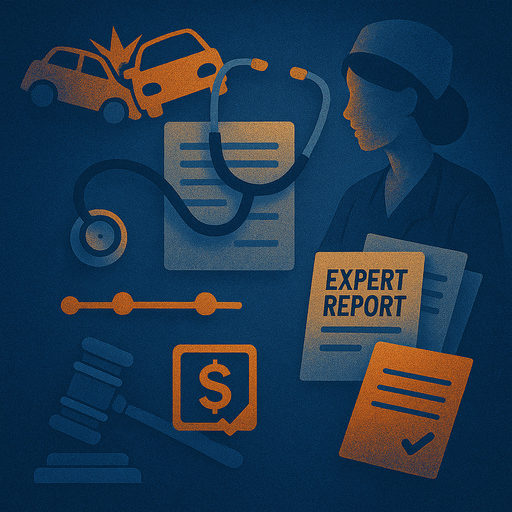Introduction
Personal injury claims can feel overwhelming, medical bills mount, you’re out of work, and insurance adjusters push lowball offers. But armed with the right strategy, you can protect your rights and secure the compensation you deserve.
1. Immediate Steps After an Accident
- Seek Medical Attention: Even if injuries seem minor, a prompt exam creates an official record.
- Document the Scene: Photos of skid marks, wet floors, or broken railings can become powerful evidence.
- Gather Witness Info: Names, contact details, and brief statements from anyone who saw what happened.
2. Building Your Case
Medical Records & Bills Collect all treatment records, hospital invoices, prescription receipts, and therapy notes. Make sure each entry clearly ties back to your accident.
Expert Opinions In complex cases, like traumatic brain injury or spinal damage, a medical expert’s testimony can quantify long-term care needs and lifetime expenses.
3. Valuing Your Claim
- Special Damages: Out-of-pocket costs such as medical bills, rehabilitation, and property damage.
- General Damages: Non-economic losses, pain & suffering, emotional distress, and loss of enjoyment of life.
- Future Damages: Ongoing care expenses, projected income loss, and assistance needs.
4. Negotiation Tactics
- Don’t Accept the First Offer: Insurers often start low. Counter with a detailed demand letter.
- Use Leverage: Highlight strong evidence, photographs, medical reports, and expert opinions, to justify your number.
- Be Prepared to Litigate: Showing willingness to file suit can motivate a carrier to improve its offer.
5. Timeline & Statute of Limitations
Each state imposes a deadline, often two to three years, from the date of injury. Filing too late can forever bar your right to compensation. Plan your investigation and demand well before that cutoff.
6. Choosing the Right Attorney
Look for a lawyer who:
- Specializes in personal injury and has a track record of six- or seven-figure settlements.
- Offers a contingency-fee arrangement (no recovery, no fee).
- Maintains clear communication, regular status updates and prompt responses to your questions.
Conclusion
By taking swift action, meticulously documenting your losses, and partnering with experienced counsel, you can navigate the complex personal injury process with confidence, and secure the full compensation you need to move forward.


